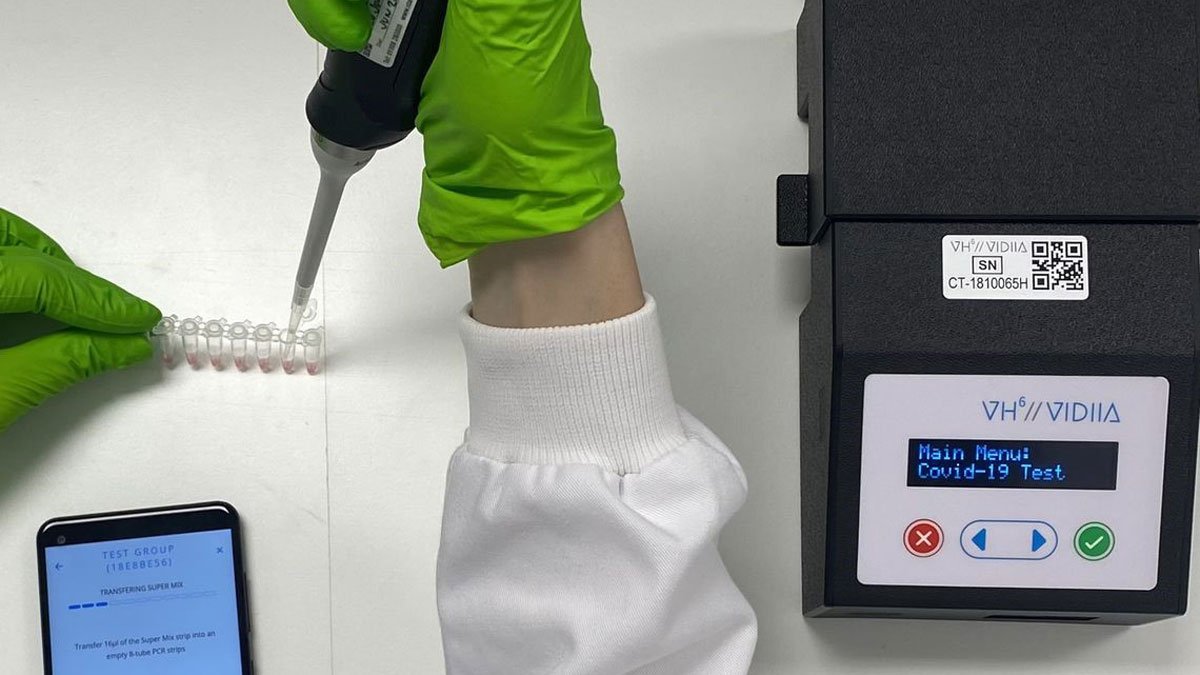Royal Lancaster Infirmary to trial new rapid COVID-19 test
A new, highly accurate COVID-19 test, developed by the University of Surrey, Brunel University London and Lancaster University in collaboration with commercial partner Vidiia Ltd is being trialled at an NHS hospital, the Royal Lancaster Infirmary.

Dr Craig Williams, Consultant Microbiologist from University Hospitals of Morecambe Bay NHS Foundation Trust, said: "We are delighted to be involved in this trial of a new, rapid, test for COVID-19 which builds on our collaboration in providing testing for our local population early in the pandemic. It is another step forward to increasing community testing not only here in the UK, but around the world. We are privileged to be playing a crucial role in the trial and look forward to following its progress."
The diagnostic device, known as Virus Hunter 6 (VH6), has already received approval from the Medicines and Healthcare products Regulatory Agency and has CE marking. It can test up to six samples simultaneously, delivers results in under 20 minutes and was shown to be 99 per cent accurate in lab trials.
One part of the collaborative project involves Lancaster University and Morecambe Bay University Hospitals NHS Trust who will collect two nasal and oral swabs from each patient admitted to the Royal Lancaster Infirmary.
Developed by Dr Anil Fernando and his team at the Centre for Vision of Centre for Vision, Speech and Signal Processing at the University of Surrey, the VH6 digital device communicates the results of the test to a mobile App. The Surrey team at the School of Veterinary Medicine led by Professor Roberto La Ragione and the School of Biosciences and Medicine has also been instrumental in developing and validating the test. The team has also designed an innovative new buffer for use with the device which reduces processing time, makes handling samples much safer, and removes the need to send samples off to a laboratory.
Roberto La Ragione, Professor of Veterinary Microbiology and Pathology at the University of Surrey said: “This trial, together with the validation testing that is taking place on our campus, brings us potentially one step closer to the rolling out of this device on a national and global scale. From the beginning of this pandemic there has been a pressing need to develop, an accurate, inexpensive, rapid device that can be used to diagnose COVID-19, initial results from our testing with Virus Hunter 6 has shown that it has the potential to do just this.”
Dr Anil Fernando, Reader in Video Communication at the University of Surrey, said: “This is an exciting step in the potential roll out of this device. The AI and app capabilities developed by my team are one of the differentiating features of this device from others being used and it will be interesting to learn more about the experiences medical professionals have in using it.”
Dr Muhammad Munir of Lancaster University said “This clinically validated device will enhance the community testing capacity of the UK, and globally. This will save costs, and will provide fast track diagnostics, resulting in early case detection, thus promoting effective disease management and preventing community spread, and ultimately saving lives.”
“Once the clinical validation testing of the devices has been completed, the device will pave the way for global distribution.”
CEO of Vidiia Ltd David Rimer said: “The team at Vidiia are extremely grateful to Dr Munir and his team at Lancaster University for heading up our first NHS trial. By gaining more results using NHS patient samples across three COVID wards, this will assist hugely in generating significantly more data from positive patients across a broader demographic.
“This is yet another great example of how effective our consortium of universities is in their valued contribution to the success of a product that allows our customers to operate with less restrictions and ultimately assist in a strengthening economic outlook.”
Professor Wamadeva Balachandran at Brunel University London led the university consortium, said: "The trial will further validate VH6, not only in the developed world, but in less developed countries and remote areas because it doesn't need expensive support equipment and health workers need little training to use it”.
Featured Academics
Media Contacts
External Communications and PR team
Phone: +44 (0)1483 684380 / 688914 / 684378
Email: mediarelations@surrey.ac.uk
Out of hours: +44 (0)7773 479911


